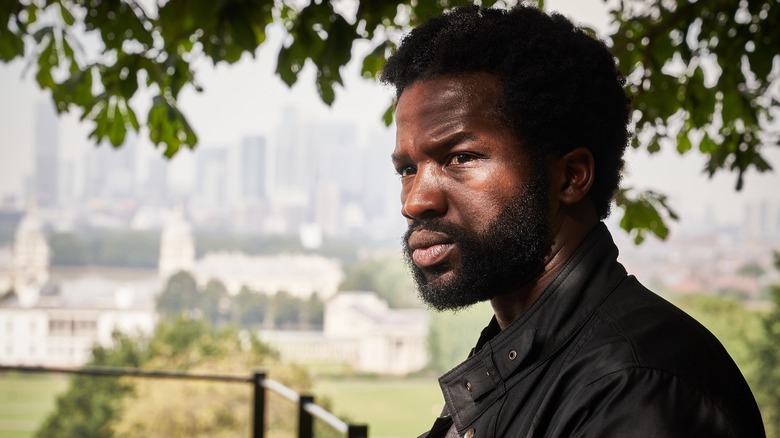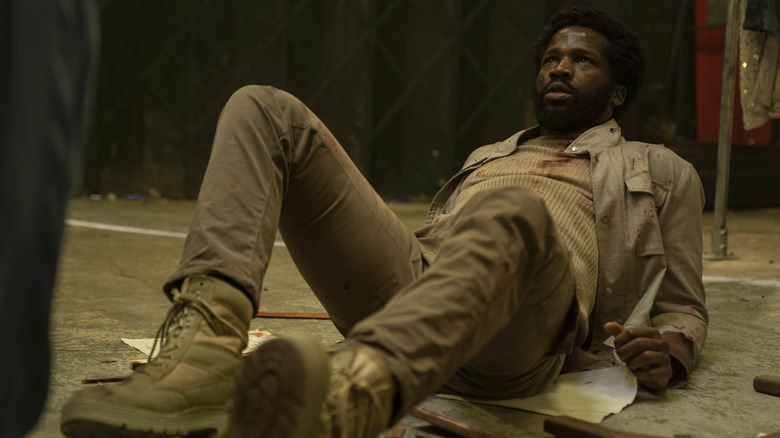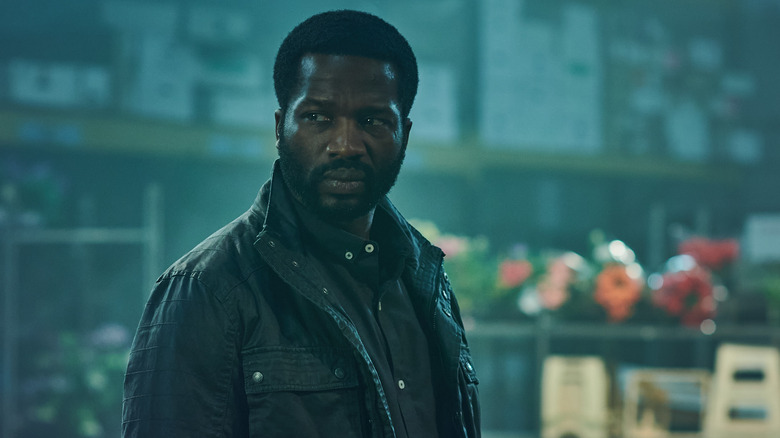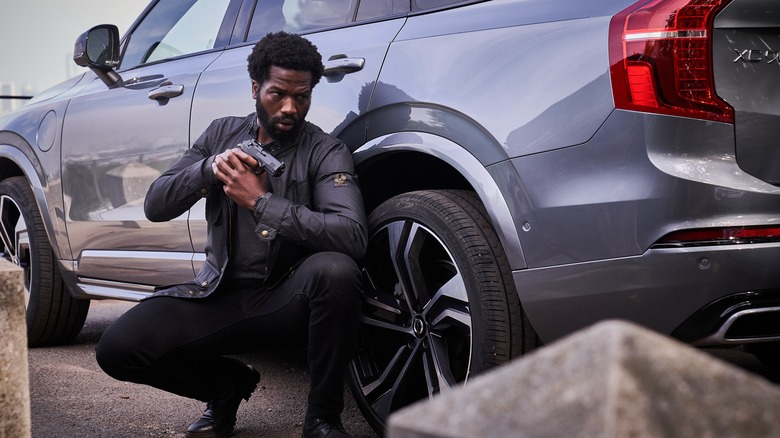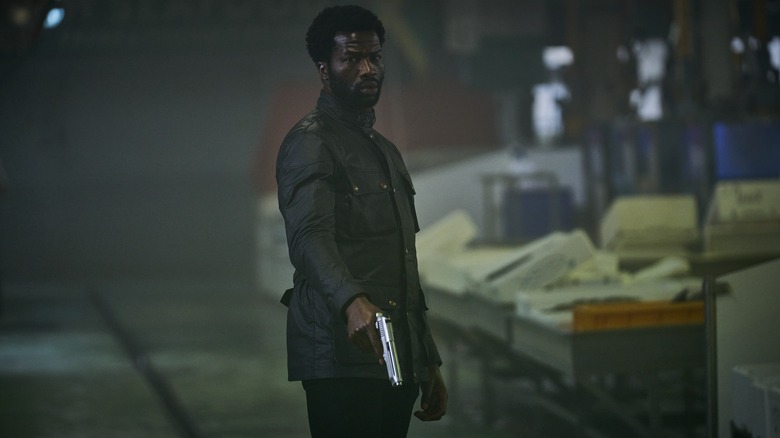Gangs Of London's Corin Hardy And Ṣọpẹ́ Dìrísù On Season 2's Heavy Emotions And High-Octane Action [Exclusive Interview]
For fans of action TV and martial arts cinema, "Gangs of London" is one of the greatest series of the modern era. Created by Matt Flannery and "The Raid" director Gareth Evans, series director Corin Hardy ("The Hallow," "The Nun") has crafted a high-octane gangland thriller with the kind of stunts you don't typically see on TV. Season 1 ended with the series' mysterious Investors achieving apparent victory in their efforts to eliminate Sean Wallace (Joe Cole), replace him as head of the Wallace Organization, and get back to business as usual. Meanwhile, undercover cop Elliot (Ṣọpẹ́ Dìrísù) finds himself in a bind that only changing alliances can solve. Now working for the villainous Investors, Elliot has to get himself free from their grasp.
In a wide-ranging interview, I spoke with Corin Hardy and Ṣọpẹ́ Dìrísù about the show's second season. We discussed the origins of that major opening surprises, the final episodes' most intense action sequences, the secrets behind Dìrísù's most emotionally devastating moment, and more.
This interview contains spoilers for season 2, and was lightly edited for clarity and brevity.
'The show always has to feel dangerous'
Corin, season 2 throws major early shockers at the audience. A major death, a major rebirth. Tell me about shaping those story turns. Did you always know that's what you wanted?
Hardy: Yes! First of all, I think when we created season 1, we could recognize some of the factors that were successful about it, and that brought the audience to keep watching, and one of those is danger. Gareth always said, "The show always has to feel dangerous." I really loved that, and wanted to take that as far as it'll go in season 2. Not just danger in action or violence, but actually danger in the sense of safety, that you're not sure where this is going.
The thing I was scared of is doing a TV show that feels like a TV show, where you get used to the characters always being there, and then everyone's returning every episode or every season and it goes on and on. So it's important to create an unpredictability within it, so that you're always on edge. Something Spielberg did with "Jaws," when he kills that kid, where you're just like, "Oh my God, if he's done that, where can this go?" So one of the factors I suppose is no one's safe, and if the story demands it, characters may find their fate earlier than you thought, sometimes.
That said, the story kind of almost morphs and changes as you work with it. So we spent probably a year before we were shooting, when we were mapping out the story and bringing the scripts together ... with Paapa Essiedu's character, Alex, it was really quite tragic and heart-wrenching. But it was something that also felt [like] if, in that first episode, a character as solid as him was to meet their end, and it's coming at a time when the investors are really throwing their weight, and they've sent Elliot to kill him and they're going after Luan, it will really propel that danger throughout the show.
I love that unpredictability, it's rare these days.
'If we had done the explosive, destructive scene, it wouldn't have been as powerful'
Ṣọpẹ́'s emotional breakdown in episode 6 is an incredibly powerful, heart-wrenching scene. Let's talk about it.
Dìrísù: Thank you so much. I enjoy that you've picked that scene out, actually, because I'm a big believer that the universe sometimes forces you into really good decisions. I think Nima Nourizadeh was the one that was directing that episode. When we got to the room, I've done all this preparation, as you should do as an actor — do as much prep as you can before you get into the room — and then Ollie, the standby art director, said to me, "Okay, I know it says in the script that you, like, smash the place up, but you really can't do that." I was like, "What do you mean?" He's like, "We don't have repeats of anything. Not a single lampshade, not a table, so please, please, please do not break anything."
I was just like, "What do you want me to do, then? Because the script literally says, 'Like a bull in a China shop, this guy rips this place apart in his grief.'" And I was just like, "Oh, okay, cool. I don't have time to be in my feelings about how we don't have what the scene needs, and so we just have to make a different decision." And I really appreciate her generally, Pippa Bennet Warner, who plays Shannon in the series. She's such a wonderful scene partner, and I've known her for a really long time, and I completely trust her. I was glad that she was able to trust me to really explore with distances, and there's this drama game that I played when I was younger about ... you are in a room full of different people, and you're all walking about. You have to pick someone in the room who's the "bomb," and everyone could pick a different person, and everyone's got to stay as far away from "the bomb" as possible, and then somebody else would be your shield. You have to put the shield in between you and the bomb, and I just felt these drama games come back to me instinctively.
I need to be as far away from this person as possible, but also she's the person that I need the most comfort from. And that push and pull, all of those things I wouldn't have considered if I was able to just break the room apart, so I was forced into making better acting choices than maybe I would've done if I had just prepared –
Hardy: Sorry, do you know what? I'd never heard that story, and I haven't talked to you enough about that scene and it always devastates me. I think your performance is so powerful, and actually hearing that story I can understand, because what gets me is it is so interior. What you are going through feels so raw, and you could sort of feel your heart breaking. And it is just such a really emotional groan that comes out of you, and it is actually, as you said, if you were able to make it all come out, you would've done something angry and physical. But actually, it's just roiling up inside you, man. It always gets me.
Dìrísù: I appreciate it! Yeah, and I'm kind of like glad that was the final version of it, because maybe if we had done the explosive, destructive scene, it wouldn't have been as powerful.
'When designing action, I'm really trying to figure out fresh environments'
I love that scene. It's a brilliant performance, and it really stands out for being more emotionally driven than violent.
Hardy: Also, considering what he's just done previously to it in terms of the action that you've seen before that, it [has a real contrast].
Absolutely. For both of you, the series has so many major set pieces in both seasons, action-wise, and I love season 2's fish market sequence.
Hardy: Cool, thanks.
They're all so well-directed. For both of you, from your distinct perspectives as director and performer, what was the most difficult or complex action sequence that you've been involved with?
Hardy: Should I go first?
Dìrísù: Yeah, and I'd be surprised if it's not the same one, but go ahead.
Hardy: It's obviously a really big part of the show, and it's something I relish the chance to really go deep with: designing the action and conceiving as many original set pieces [as possible], from the Luan home invasion in the first one, and the launderette fight with Elliot. But I think the one I'm most proud of, and it's the most complex in some ways because it was sort of involving the environment it was in, was ... it's something that happens in episode 7 when they go to Paris, and Elliot has to infiltrate a kind of Korean-style underground karaoke bar. I don't want to spoil it, but it was ... when designing action, I'm really trying to figure out fresh environments that are going to inform the action, inform the weapons, inform the geography, the choices, the emotions, and I'd always wanted to do something quite musically themed, in a way.
Setting it in a kind of Korean karaoke labyrinth meant that we'll track Elliot infiltrating this place, and you get these different musical genres that he kind of passes by, and then he will end up fighting his way back out through them. And also using improvised weaponry [such] as a mic stand, which I hadn't seen used. I have a band as well, and I always have this heavy mic stand with a heavy bass. I thought mic stands could be really good weapons, because you could use it as a club, you could use it as a ram, you could use it as spear, and Elliot will do all of those things. That was a real ... we did a lot of previews months ahead of it, and Ṣọpẹ́ did a hell of a lot of rehearsing with Tim Conley, the action designer, to make that one hopefully a standout.
'We were totally at the mercy of the elements with the final fight sequence'
I love it. Ṣọpẹ́, is that your choice?
Dìrísù: No, it wasn't actually. I was going to go for the final fight sequence, and applaud Corin Hardy for the work that he'd done, putting it all together. Because when you said "the environment," I was just like, "Oh yeah, of course he's going to mention the final fight sequence," because the environment that we had to work in ...
Hardy: I really did want to talk about it. I suppose I was nervous to not give too much away, but go on.
Dìrísù: Oh yeah, I'll skirt around it as much as possible, but we basically got flooded out of our set one day. We had to stand down because the rain was coming down too hard and it was just not a safe working environment. We couldn't get any of the vehicles towards set, or between the set and the unit base. It was cold, it was wet, dark, and also the choreography was extensive and complicated, and the camera moves were really specific. We had drones. I think it is probably the most complicated sequence I've done in any form, let alone an action sequence, and the repetition as well ... I mean, I got Covid during that sequence.
Hardy: Yeah, everyone did.
Dìrísù: So yeah, at least in [the Korean bar] sequence we were able to control our environment. We were totally at the mercy of the elements with the final fight sequence, but yeah, it's also stunning when you see it at the end, so it is definitely something to look forward to.
Hardy: Very proud of that sequence. And just to add, they're quite different, because that one is literally out in the elements. We filmed it in December last year in Dartford, which is a place right on by the river Thames, and it is freezing cold. The ground was freezing, the crew was freezing, and the actors still had to perform this extensive multilayered fight, which I'm really excited for people to see.
"Gangs of London" season 2 is currently airing on AMC+.
